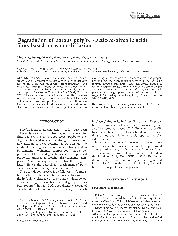摘要
Poly(D,L-lactic-co-glycolic acid) has been extensively used as a controlled release carrier for drug delivery due to its good biocompatibility, biodegradability, and mechanical strength. Effects of dense and porous film's degradation behavior have been systematically investigated up to 17 weeks in Hank's Simulated Body Fluid at 37 degrees C. The degradation of the films was studied by measuring changes in weight, molecular weight and its distribution, morphology, composition etc.. A special thing was that the differences in water diffusion in dense and porous structure films caused the different degradation behavior. According to the characteristic changes of various properties of films, the degradation process is suggested to be roughly divided into four stages, tentatively named as water absorption stage, dramatic loss of molecular weight or micro-pores formed stage, loss of weight or enlarged-pores formed stage, pores diminished or pores collapse stage.
- 出版日期2007-3-15
- 单位大连理工大学
